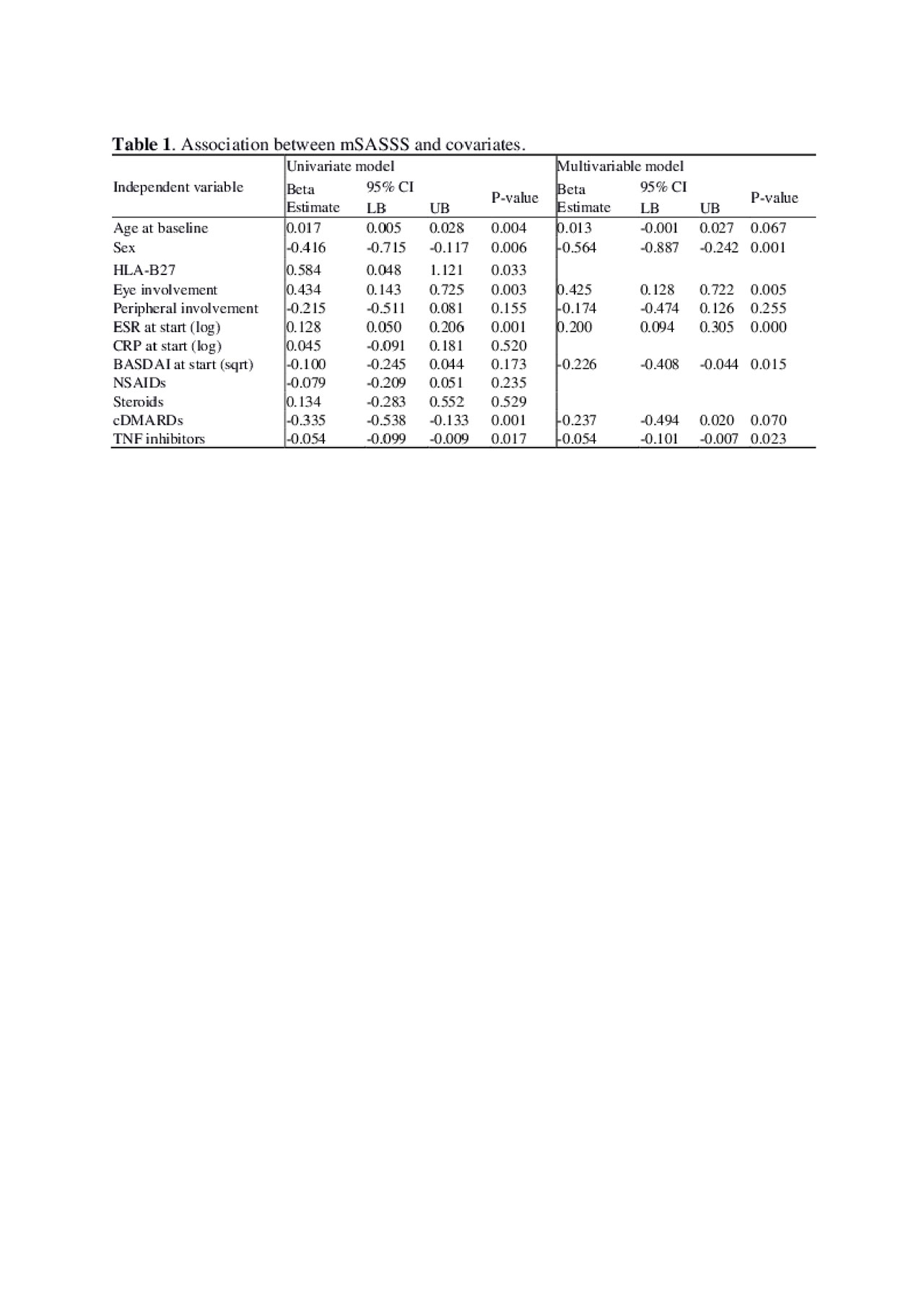Session Information
Session Type: ACR Abstract Session
Session Time: 4:30PM-6:00PM
Background/Purpose: It is difficult to evaluate the role of TNF inhibitor therapy in slowing the radiologic progression in patients with ankylosing spondylitis (AS) because of frequent changes in disease activity and medication. In addition, the role of TNF inhibitors in slowing the radiologic progression was underestimated because most patients starting TNF inhibitors were in a high inflammatory state. Therefore, an analysis of time varying compounders such as disease activity is essential. The aim of this study was to investigate whether long-term treatment with TNF inhibitors can reduce radiographic progression in patients with AS using an 18-year longitudinal cohort data.
Methods: Of the 1,280 patients who followed for 18 years in single center cohort, data of 328 patients treated with TNF inhibitors were included. For each patient who received TNF inhibitors, the time interval was categorized based on the patient’s TNF inhibitor status (‘on the TNF inhibitors’ and ‘off the TNF inhibitors’ intervals). The data were analyzed using the Modified Stoke Ankylosing Spondylitis Spinal Score (mSASSS), erythrocyte sedimentation rate (ESR), c-reactive protein (CRP), and Bath Ankylosing Spondylitis Disease Activity Index (BASDAI) and imputed at each time point by linear interpolation. We obtained 2315 intervals (1,063 intervals ‘on the TNF inhibitors’ and 1,252 intervals ‘off the TNF inhibitors’) from 328 patients with computable intervals. A multivariable linear regression with compound symmetry correlation structure within each patient was performed using a generalized estimating equation for rate of change in mSASSS (per year) as the outcome, and with ESR, CRP, and BASDAI as the time-varying covariate. A marginal structural model for inverse probability of treatment weighting (MSM with IPTW) was constructed to evaluate the underestimated effect of TNF inhibitors.
Results: The rate of mSASSS significantly decreased with the use of TNF inhibitors (b=-0.054, p=0.023 in the multivariable model) (Table 1). The adjusted rate of mSASSS with multivariable analysis was 0.916 per year during ‘on the TNF inhibitors’ and 0.970 per year during ‘off the TNF inhibitors’ period when the other covariates were fixed at their mean values. However, the role of TNF inhibitors was underestimated on the rate of mSASSS because ESR and CRP at the start of interval were significantly higher in ‘on the TNF inhibitors intervals (b=-5.946, p< 0.001 and b=0.412, p< 0.001, respectively). To eliminate the effects of confounding variables such as ESR and CRP on the mSASSS, we created a pseudo-population using an IPTW. (Table 2) The rate of mSASSS showed a greater decrease with the use of TNF inhibitors (b=-0.111, p< 0.001) than in the multivariable regression model. The adjusted rate of mSASSS was 0.848 per year during ‘on the TNF inhibitors’ and 0.959 per year during ‘off the TNF inhibitors’ intervals.
Conclusion: TNF inhibitor treatment significantly slowed radiologic progression when compared to other therapies. In addition, the effect of TNF inhibitors on radiological progress has been previously underestimated.
To cite this abstract in AMA style:
Koo B, Oh J, Park S, Ahn G, Lee S, Joo K, Kim T. Tumor Necrosis Factor Inhibitors Slow Radiologic Progression in Patients with Ankylosing Spondylitis: 18-year Longitudinal Cohort Study [abstract]. Arthritis Rheumatol. 2019; 71 (suppl 10). https://acrabstracts.org/abstract/tumor-necrosis-factor-inhibitors-slow-radiologic-progression-in-patients-with-ankylosing-spondylitis-18-year-longitudinal-cohort-study/. Accessed .« Back to 2019 ACR/ARP Annual Meeting
ACR Meeting Abstracts - https://acrabstracts.org/abstract/tumor-necrosis-factor-inhibitors-slow-radiologic-progression-in-patients-with-ankylosing-spondylitis-18-year-longitudinal-cohort-study/


